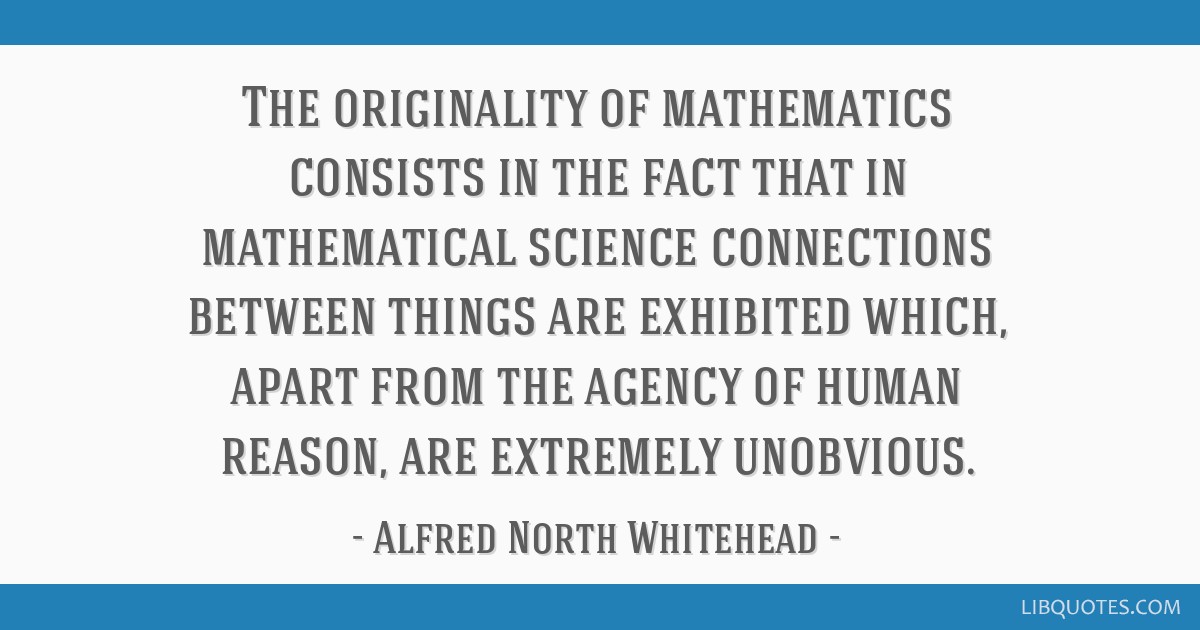

Other examples are papers on “The Geodesic Geometry of Surfaces in Non-Euclidean Space” (1898) and “Sets of Operations in Relation to Groups of Finite Order” (1899). The first area, algebra and geometry, contains his writings in pure mathematics, chief among which is his first book, A Treatise on Universal Algebra (1898).

White-head’s mathematical work falls into three general areas, the first two of which belong to his residence at Cambridge University, the third to his London period. Noteworthy among his several other books are The Aims of Education (1929) and Religion in the Making (1926), in which he combines a sensitivity to religious experience with a criticism of traditional religious concepts.Īlthough Whitehead’s intellectual importance lies mainly in philosophy itself, he did significant work in mathematics, mathematical logic, theoretical physics, and philosophy of science. These three works contain the essentials of his metaphysical thinking. The writings of his third, or Harvard, period were distinctly philosophical, commencing with Science and the Modern World (1925), and culminating in Process and Reality (1929) and Adventures of Ideas (1933). He was stimulated in this work by participating in the discussions of the London Aristotelian Society. In his second, or London, period, White-head devoted himself to rethinking the conceptual and experiential foundations of the physical sciences. At Cambridge University his writings dealt with mathematics and logic, although his thought already displayed those more general interests that would lead him to philosophy. Whitehead’s life and work thus fall naturally into three periods which, although distinct, manifest a unity of development in his thought. In 1945 he was also awarded the British Order of Merit. He had enjoyed the rare distinction of election to fellowships both in the Royal Society and in the British Academy. Whitehead died in his second Cambridge ten years later, still a British subject, but with a great affection for America. He retired from active teaching only in June 1937, at the age of seventy-six. There his previous years of reflection issued in a rapid succession of philosophical works of first importance, principally Process and Reality: An Essay in Cosmology (1929). In 1924, at the age of sixty-three, Whitehead became a professor of philosophy at Harvard University.

During this period, while active in assisting to frame new educational programs, he turned his reflective efforts toward formulating a philosophy of science to replace the prevailing materialistic mechanism, which in his view was unable to account for the revolutionary developments taking place in science. In 1910 Whitehead moved to London, where he held a variety of posts at University College and was professor at the Imperial College of Science and Technology. Three children were born to them between 18: Thomas North, Jessie Marie, and Eric Alfred, who was killed in action with the Royal Flying Corps in 1918. In 1890 he married Evelyn Willoughby Wade, whose sense of beauty and adventure fundamentally influenced Whitehead’s philosophical thought. During the latter part of this period he used to give political speeches in the locality these favored the Liberal party and often entailed his being struck by rotten eggs and oranges. His residence at Cambridge, first as scholar, then as fellow, and finally as senior lecturer in mathematics, lasted from 1880 to 1910. Although during his whole undergraduate study all his courses were on pure or applied mathematics, he nevertheless developed a considerable knowledge of history, literature, and philosophy. In the autumn of 1880 he entered Trinity College, Cambridge. Whitehead excelled in mathematics, grew to love the poetry of Wordsworth and Shelley, and in his last year acted as head of the school and captain of games. The school to which he was sent in1875, Sherborne in Dorset, traced its origin to the eighth century. As a child Whitehead developed a strong sense of the enduring presence of the past, surrounded as the was by relics of England’s history. Mathematics, mathematical logic, theoretical physics, philosophy.Įducation, religion, and local government were the traditional interests of the family into with Whitehead was born, the son of a southern English schoolteacher turned Anglican clergyman. Cambridge, Massachusetts, 30 December 1947) Ramsgate, Kent, England, 15 February 1861 d.


 0 kommentar(er)
0 kommentar(er)
